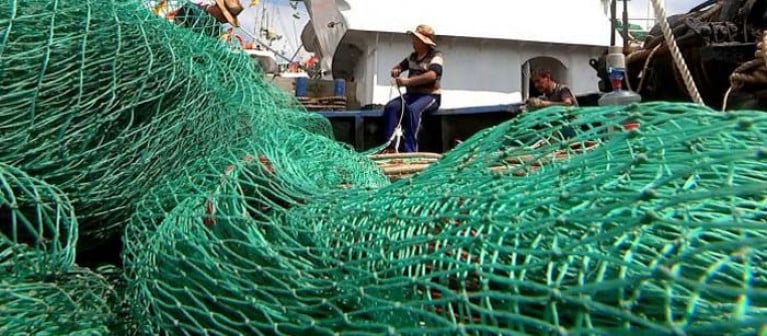Skateboards, sunglasses, bicycle baskets, bird feeders and socks can all be manufactured from recycled fishing gear, a seminar at NUI Galway has heard writes Lorna Siggins
Nets, gear and other plastic material washed up on the coast could provide business opportunities in a “blue circular economy”, participants in an EU-funded research project have said.
A new EU directive on single-use plastics is driving research on recycling and re-use, with Ireland among European member states bound to establish “producer responsibility” schemes.
Fishing skippers and representatives across the marine, business and waste sectors attended the conference, hosted by the Western Development Commission at NUI Galway on January 22.
EU maritime affairs directorate official Alena Petrikovicova – de Chevilly explained that the new schemes for producer responsibility must be in place by 2024, and member states will have to establish national collection targets.
She outlined how over €15 million has been allocated from the European maritime fisheries fund for 22 research projects, including reduction of marine litter, while €18.7 million has been allocated for 26 projects underway to establish centres like “blue laboratories” testing new uses for used equipment.
There are no accurate figures for the fishing gear as a percentage of total plastic waste, according to Richard Glavee-Geo, associate professor at the Norwegian University of Science and Technology. In Norway, one estimate suggested up to 37 per cent of marine waste is linked to fishing, while 38 per cent is consumer waste, he said.
NUIG Ryan Institute director Prof Charles Spillane said it was already projected there would be more plastic than fish in the oceans by 2050 at current disposal rates.
Prof Spillane explained that the “blue circular economy “ concept was pioneered by round world sailor Ellen McArthur through the environmental foundation which she established.
Recycling and re-use of plastic constituents used in fishing gear is at an early stage in Europe, with two major recyclers – Aquafill in Italy, which recycles nylon for use in nylon yarn, and Plastics Global in Italy which turns nets into pellets.
Prof Martin Charter of the Centre for Sustainable Design in Surrey, England described how companies are exploring uses of recycled fishing , fish and shellfish farming equipment in products ranging from skateboards to dog leads to bicycle baskets.
He said Adidas was claiming that it uses gill nets in making sports shoes, but companies will have to conform to regulations which ensure that there are credible recycled constituents.
One north American company, Bureo, works directly with fishing communities on recycling, and has designed an office chair that comprises almost 14 lbs of waste fishing gear material, Prof Charter noted.
Several participants at the workshop, including Simon Rooney of Walsh Waste in Galway, noted that incentive schemes would be required to ensure the burden of cost of recycling marine litter is not placed on fishing communities.
He suggested incentives such as the car tyre and farm waste recycling schemes as options.
West Cork fisherman Niall Duffy, who is part of the Smartnet project run with Bord Iascaigh Mhara, said that legislation had been rushed through by the EU without consulting fishing communities.
Mr Duffy said it was his personal view that 80 per cent of fishing gear washed up on the Irish south-west coast was from non-Irish vessels. He also noted that skippers would not willingly discard valuable nets at sea, due to the cost.
The Blue Circular Economy initiative, which the WDC is involved in with partners in Norway, Finland, Denmark, Greenland, Scotland, Iceland and Spitsbergen, and the Faeroe Islands, aims to establish regional clusters which will mentor small and medium enterprises on “eco-innovation” related to waste fishing gear.
The three-year project is funded by the Northern Periphery & Arctic (NPA) Programme as part of the European Regional Development Fund.
































































